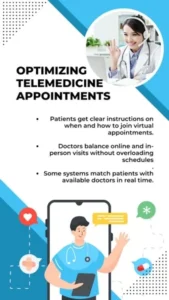HEALTH AND FITNESS
How Can Smart Scheduling Improve Healthcare Workflows

Have you ever felt frustrated waiting too long for a doctor’s appointment? Or maybe you’ve seen nurses rushing from one patient to another without a break? In healthcare, time is precious. Patients need care quickly, and staff need to work efficiently.
But when schedules are messy, everything becomes stressful. Triage scheduling can solve this problem. This term, often used in healthcare management, refers to efficiently distributing staff, equipment, and time to maximize patient care.
Reducing Patient Wait Times
Long wait times are one of the biggest frustrations for patients. When appointments are delayed, people feel stressed and uncomfortable. They might even avoid seeking medical care because they don’t want to wait for hours.
Using digital scheduling tools, clinics can track appointment durations and patient flow. If a doctor tends to run behind schedule, the system can adjust future bookings. It can also notify patients in advance if their appointment might start later. This prevents overcrowding in waiting rooms and keeps patients informed. When wait times go down, patient satisfaction goes up.
Improving Staff Efficiency
Healthcare providers face intense workload challenges, including medical doctors, nursing staff, and other healthcare workers. A practice management system can streamline scheduling, ensuring balanced workloads. Staff may feel overwhelmed when patient loads become too dense for one shift. On the other hand, too much space between appointments leads to inefficiency.
Hospitals implement automation in their shift assignment systems to achieve both objective workforce distribution and adequate staff quantity. Such tools account for staff meal breaks, patient needs, and potential emergency requirements. Effective work schedule organization allows healthcare providers to reduce their burnout risk.
Minimizing No-Shows and Cancellations
Missed healthcare appointments have become a frequent issue within medical facilities today. Time slots go to waste when patients miss their scheduled appointments. Such a practice creates a waste of resources while destroying the planned schedule.
The use of smart scheduling systems avoids scheduling problems because they automatically send alerts to patients. Healthcare facilities send appointment alerts through email and texting services to their patients. The practical implementation of this methodology lowers missing appointment rates effectively.
Enhancing Communication Between Departments
The different departments in hospitals and clinics work together as a unified system. The healthcare journey for a patient entails visiting their general doctor before proceeding to laboratory testing and concluding with consultation from a specialist. The scheduled timetables should match up otherwise this process turns disorderly.
The system identifies free appointment times to immediately organize an X-ray examination after a patient consultation. Fast patient care remains possible thanks to these systems which prevent unnecessary delays. Such departmental communication leads to organized hospital workflows that create better patient experiences.
Managing Emergency Cases Effectively
Emergencies happen at any time. Without proper scheduling, they can throw off the entire day’s appointments. Smart scheduling allows hospitals to set aside time slots for urgent cases. This way, doctors are not overwhelmed, and routine check-ups are not delayed too much.
Some systems even use data to predict peak times for emergency visits. If a hospital knows when it’s usually the busiest, it can adjust staffing accordingly. This ensures there are always enough doctors and nurses available when needed. A well-prepared hospital can save more lives and reduce stress for both staff and patients.
Optimizing Telemedicine Appointments
With the rise of telemedicine, scheduling has become even more important. Virtual consultations allow patients to receive medical advice without visiting a clinic. However, if appointments are not managed properly, delays and miscommunications can occur. Smart scheduling helps organize telemedicine sessions efficiently.

Patients receive clear instructions on when and how to join their virtual appointment. Doctors can schedule online consultations between in-person visits without overloading their schedules. Some systems even match patients with available doctors in real-time. By streamlining telemedicine, smart scheduling makes healthcare more accessible and convenient.
Reducing Administrative Burden
Scheduling appointments manually takes a lot of time. Receptionists and administrative staff must answer calls, check calendars, and reschedule appointments constantly. This takes away time that could be spent assisting patients in other ways.
With smart scheduling, most of these tasks are automated. Patients can book appointments online, receive instant confirmations, and reschedule without needing to call the clinic. Staff can focus on more important duties instead of spending hours managing schedules. Less paperwork and fewer phone calls mean a more efficient workplace.
Ensuring Fair Workload Distribution
In healthcare, some staff members end up with more responsibilities than others. If shifts are not assigned properly, certain doctors or nurses may feel overworked while others have lighter schedules. This leads to exhaustion and dissatisfaction.
Smart scheduling tools analyze workload distribution and assign shifts fairly. They consider factors like working hours, rest periods, and patient demand. If someone is working too many long shifts, the system can adjust their schedule. When workloads are balanced, healthcare workers feel more satisfied and perform their jobs better.
Personalising Patient Care
Every patient has unique needs. Some require longer consultations, while others need frequent follow-ups. Smart scheduling allows healthcare providers to personalize appointment lengths based on patient history.
For example, a patient with a chronic illness might need extra time with their doctor. The system can automatically allocate a longer slot for them. On the other hand, a patient coming in for a routine check-up may only need a short visit. This ensures that each patient gets the right amount of attention without causing delays for others.
Supporting Future Growth in Healthcare
As healthcare evolves, patient demand continues to grow. Traditional scheduling methods may not be able to keep up. Smart scheduling prepares hospitals and clinics for the future. It adapts to changing needs and helps providers scale their services efficiently.
By analyzing data, healthcare organizations can predict trends and make well-informed decisions. They can see which services are in high demand and adjust schedules accordingly. This improves overall efficiency and ensures that resources are used wisely. A well-structured scheduling system allows healthcare providers to expand without compromising on care quality.
Conclusion
Smart scheduling is transforming healthcare. It reduces wait times, improves staff efficiency, and ensures patients receive timely care. Minimizing no-shows, managing emergencies, and enhancing communication between departments, create a smooth workflow. It also reduces administrative burdens and supports future growth in healthcare.
When hospitals and clinics implement smart scheduling, everyone benefits. Patients have better experiences, doctors and nurses work more efficiently, and healthcare facilities run more smoothly. In a world where time is crucial, using technology to manage schedules makes a significant difference.
FAQs
1. How does smart scheduling improve work-life balance for healthcare staff?
Smart scheduling ensures fair shift distribution, preventing burnout and allowing staff to have adequate rest between shifts.
2. Can smart scheduling help in handling seasonal patient surges?
Yes, it can predict high-demand periods, such as flu season, and adjust staffing levels accordingly to meet patient needs.
3. How does smart scheduling support medical training and education?
It allows hospitals to allocate time for training sessions without disrupting patient care, ensuring continuous learning for healthcare workers.
Was this article helpful? Don’t stop here! Explore our site for more insightful content to help you make informed, meaningful choices.
-

 BIOGRAPHY9 months ago
BIOGRAPHY9 months agoBehind the Scenes with Sandra Orlow: An Exclusive Interview
-

 HOME1 year ago
HOME1 year agoDiscovering Insights: A Deep Dive into the //vital-mag.net blog
-

 HOME1 year ago
HOME1 year agoSifangds in Action: Real-Life Applications and Success Stories
-

 BIOGRAPHY1 year ago
BIOGRAPHY1 year agoThe Woman Behind the Comedian: Meet Andrew Santino Wife




























